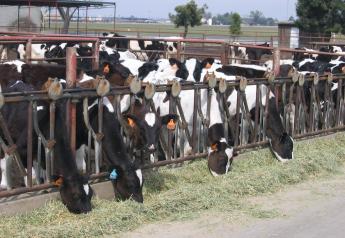Evening Report | November 21, 2022

Check our advice monitor on ProFarmer.com for updates to our marketing plan.
Corn harvest nearly finished… USDA late today reported the U.S. corn harvest was 96% finished as of Sunday, up from 93% a week earlier and ahead of the 90% average for that date the previous five years. Analysts on averaged expected harvest to be 97% complete.
Cotton harvest remains ahead of average… USDA reported the U.S. cotton harvest was 79% complete as of Sunday, up from 71% the previous week and ahead of the average for the date for the past five years, also 71%.
Winter wheat conditions unexpectedly slip… USDA reported 32% of the U.S. winter wheat crop in “good” or “excellent” condition as of Sunday, unchanged from a week earlier and one percentage point below analysts' expectations. Acreage rated poor-to-very poor rose to 33% from 32%.
|
|
This week |
Last week |
Year-ago |
|
Very poor |
15 |
14 |
8 |
|
Poor |
18 |
18 |
14 |
|
Fair |
35 |
36 |
34 |
|
Good |
27 |
27 |
37 |
|
Excellent |
5 |
5 |
7 |
Pro Farmer CCI shows further deterioration for HRW wheat… When USDA’s weekly crop condition ratings are plugged into the weighted Pro Farmer Crop Condition Index (0 to 500-point scale, with 500 being perfect), the HRW crop dropped 1.7 points to 269.0, which was 70.6 points below the five-year average. The SRW rating inched up 0.5 point to 357.5 and has improved each week since the initial rating, though that was still 4.3 points below the five-year average.
U.S. rail workers vote against contract… Workers at the largest U.S. rail union voted against a tentative contract deal reached in September, raising the possibility of a year-end strike that could cause significant damage to the U.S. economy and strand vital shipments of food and fuel, Reuters reported. Train and engine service members of the transportation division of the International Association of Sheet Metal, Air, Rail, and Transportation Workers (SMART-TD) narrowly voted to reject the deal. That unit, which includes conductors, brakemen and other workers, joins three other unions in rejecting a deal brokered via a board appointed by U.S. President Joe Biden. "
Winter wheat futures drop near three-month low… Winter wheat futures extended last week’s slide as a surging dollar fueled pessimism over export demand and the extension of the Ukraine export deal last week eased concern over global supplies. Soybean futures ended higher as firm demand fundamentals and continued dryness in Argentina encouraged buyers. January soybeans rose 8 1/2 cents to $14.36 3/4. March SRW wheat fell 3 3/4 cents to $8.18 1/4, its lowest close since Sept. 1. March corn fell 6 1/2 cents to $6.63 1/2, a one-week low.
COP27 has a bigger name than its accomplishments... Results of the latest United Nations climate summit were unveiled Sunday morning, as grueling debates over a historic fund and fossil fuel emissions forced negotiations to drag on almost two days longer than expected. One major breakthrough: The agreement to set up a “loss and damage” fund, which would offer vulnerable nations financial assistance in grappling with the climate crisis. But countries failed to commit to phasing out, or even phasing down, all fossil fuels.
The U.S. will be part of a new fund to pay reparations to poor countries. This is separate from the $100 billion a year that rich countries have promised to help poor countries reduce emissions and adapt to climate change.
Europe hopes the “loss and damage” fund will induce poor countries to reduce emissions to meet the Paris target of limiting global warming to 1.5 degrees Celsius compared to pre-industrial levels. Details about the reparations fund — including which countries will pay, how much, and which countries will benefit — will be fleshed out over the next year.
House Republicans won’t appropriate money for the fund, but the Biden administration could tap international development banks the U.S. funds.
A Wall Street Journal editorial notes: “Countries might also shake down U.S. fossil-fuel producers in their own courts. Climate reparations will merely serve as another form of global income redistribution. The Biden administration’s surrender shows again that the religion of climate change is progressive penance for the sin of being prosperous.”
Huge pile of savings that consumers built up during pandemic is shrinking... Economists expect it will run out in nine to 12 months, the Wall Street Journal (WSJ) reports. Government stimulus and constrained spending opportunities allowed households to accumulate a large amount of excess savings, of which between $1.2 trillion and $1.8 trillion remain. The savings buffer has helped Americans keep spending despite historically high inflation and rapidly rising interest rates. As those savings dwindle, signs of financial stress could reappear, such as rising default rates on loans. That stress could get more pronounced if the labor market slows. Economists surveyed by WSJ expect employers will start cutting jobs in the second and third quarters of next year.






